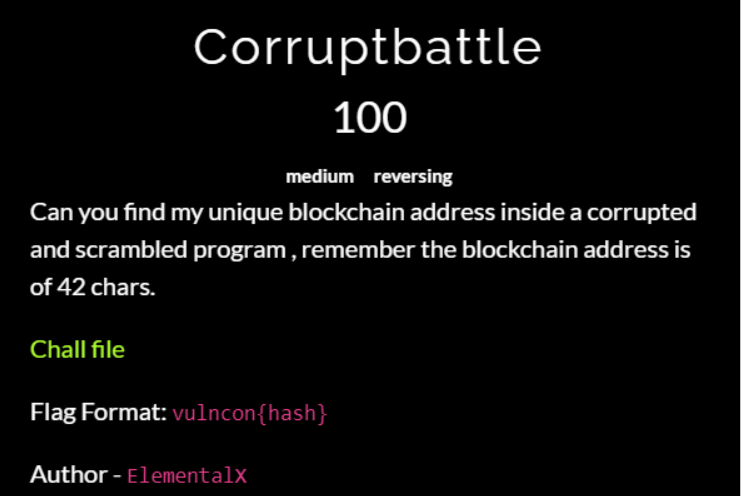VulnconCTF 2020 writeup
Reverse engineering
vulnconCTF2020
Team: Fword
Overview
Title Category Points Flag
-------------------------- ------------------- ------- -----------------------------
Corruptbattle Reverse Engineering 100 vulncon{0xE209470e1289D4CE5F23aa7e486228c46C4D99a4}
HashMe Reverse Engineering 100 vulncon{r3ver5eM4s7er}
Reverse Engineering 100: Corruptbattle
Challenge
Can you find my unique blockchain address inside a corrupted and scrambled program , remember the blockchain address is of 42 chars.

Solution
For this challenge, we are provided with a binary, and based on the description we have to find a blockchain address that is 42 chars long
So we start analyzing the binary

it‘s a 64 bit ELF binary so we open IDA and we start checking the disassembly

We notice that there is more than one function called main so after having a look we notice that in the function main_one the binary is loading a hex

We take that string and with python, we check the length:

So its length is 42 so we submit and its the flag
Flag
vulncon{0xE209470e1289D4CE5F23aa7e486228c46C4D99a4}
Reverse Engineering 100: HashMe
Challenge
I hash I xor what else can I do?

Solution
For this challenge, we are provided with a binary, and after analyzing we fin that it’s a 32bit ELF

And once we open IDA we find a lot of conditions so I understood that I have to generate a correct flag
So at first, I tried to understand the condition and use a z3 script to generate a correct flag but I found out that IDA didn’t get the conditions right so I used the disassembly to be more accurate
But the script didn’t seem to work so all that hard work was for nothing so it came up for us to use angr
import angr
import claripy
import sys
b = "HashMe.bin"
project = angr.Project(b)
length = 13
characters = [claripy.BVS('flag{-%d' %i, 8) for i in range(length)]
input_ = claripy.Concat(*characters + [claripy.BVV(b'\n')])
state = project.factory.full_init_state(args=["b"], stdin=input_)
simulate = project.factory.simulation_manager(state)
good_addr = 0x15fc
bad_addr = 0x1610
simulate.explore(find=good_addr, avoid=bad_addr)
s = []
for j in simulate.deadended:
if b"Here you go awaaaaay" in j.posix.dumps(1):
s.append(j)
valid = s[0].posix.dumps(0)
print(valid)
I calculated the addresses of the instructions using IDA hex view

Note: the script didn’t work on WSL so I tried it in a Ubuntu VM and it worked fine

Flag
vulncon{r3ver5eM4s7er}